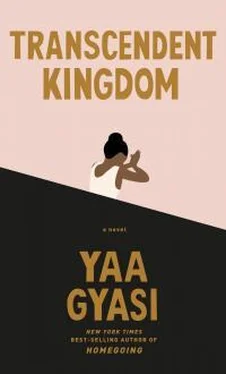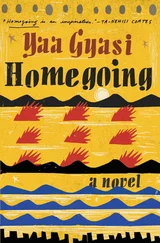Preacher’s wife was next on my list. Pastor John’s wife didn’t do much, as far as I could tell, but I decided to practice for the position by praying for all of my friends’ pets. There was Katie’s goldfish, for whom we held a toilet-bowl funeral. I said my prayer while we watched the flash of orange swirl down and disappear. There was Ashley’s golden retriever, Buddy, a frantic, energetic dog. Buddy liked to knock over the trash bins the neighbors put out every Tuesday night. Come Wednesday morning our street would be littered with apple cores, beer bottles, cereal boxes. The trash collectors started to complain, but Buddy kept living out his truth, undeterred. Once, Mrs. Caldwell found a pair of panties near her bin that didn’t belong to her, confirming a suspicion she’d had. She moved out the next week. The Tuesday night after she left, Mr. Caldwell sat outside next to his trash bin in a lawn chair, a rifle slung across his lap.
“Iffn that dog comes near my trash again, you’ll be needin’ a shovel.”
Ashley, scared for Buddy’s life, asked if I would pray for him, as I had already made something of a name for myself on the pet funeral circuit.
She brought the dog by while my mother was at work and Nana was at basketball practice. I’d asked her to come over when no one was home, because I knew that what we were doing was in a gray area, sacrament-wise. I cleared a space in the living room, which I referred to as the sanctuary. Buddy figured out something was up as soon as we started to sing “Holy, Holy, Holy,” and he wouldn’t stay still. Ashley held him down while I placed my hand on his head, asking God to make him a dog of peace instead of one of destruction. I counted that prayer successful every time I saw Buddy out and about, alive, but I still wasn’t sure if I was destined for the ministry.
It was my high school biology teacher who urged me toward science. I was fifteen, the same age that Nana was when we discovered he had a habit. My mother had been cleaning Nana’s room when she noticed. She’d gotten a ladder from the garage so she could sweep out his light fixture, and when she put her hand in the glass bowl of the light, she found a few scattered pills. OxyContin. Gathered there, they’d looked like dead bugs, once drawn to the light. Years later, after all the funeral attendants had finally gone, leaving jollof and waakye and peanut butter soup in their wake, my mother would tell me that she blamed herself for not doing more the day she’d cleaned the light. I should have said something kind in return. I should have comforted her, told her it wasn’t her fault, but somewhere, just below the surface of me, I blamed her. I blamed myself too. Guilt and doubt and fear had already settled into my young body like ghosts haunting a house. I trembled, and in the one second it took for the tremble to move through my body, I stopped believing in God. It happened that quickly, a tremble-length reckoning. One minute there was a God with the whole world in his hands; the next minute the world was plummeting, ceaselessly, toward an ever-shifting bottom.
Mrs. Pasternack, my biology teacher, was a Christian. Everyone I knew in Alabama was, but she said things like “I think we’re made out of stardust, and God made the stars.” Ridiculous to me then, weirdly comforting now. Then, my whole body felt raw, all of the time, like if you touched me the open wound of my flesh would throb. Now, I’m scabbed over, hardened. Mrs. Pasternack said something else that year that I never forgot. She said, “The truth is we don’t know what we don’t know. We don’t even know the questions we need to ask in order to find out, but when we learn one tiny little thing, a dim light comes on in a dark hallway, and suddenly a new question appears. We spend decades, centuries, millennia, trying to answer that one question so that another dim light will come on. That’s science, but that’s also everything else, isn’t it? Try. Experiment. Ask a ton of questions.”
—
The first experiment I can remember performing was the Naked Egg experiment. It was for my middle school’s physical science class, and I remember it, in part, because I’d had to ask my mother to put corn syrup on the grocery list, and she’d grumbled about it endlessly all week long. “Why doesn’t your teacher buy you the corn syrup if she wants you to do this nonsense?” she said. I told my teacher that I didn’t think my mother would buy the corn syrup, and, with a little wink, my teacher gifted me a bottle from the back of her storage closet. I thought this would please my mother. After all, it’s what she had been asking for, but instead it only mortified her. “She’ll think we can’t afford corn syrup,” she said. Those were the hardest years, the beginnings of the just-the-two-of-us years. We couldn’t afford corn syrup. My teacher went to our church; she knew about Nana, about my father. She knew my mother worked twelve-hour shifts every day but Sunday.
We started the Naked Egg experiment at the beginning of the week by putting our eggs in vinegar. The vinegar dissolved the shell, slowly, so that by Wednesday’s class we had a naked egg, urine-yellow and larger than a regular egg. We put the naked egg into a new glass and poured corn syrup over it. The egg we saw the next day was shriveled, flattened. We put the deflated egg in colored water and watched the blue expand, color pushing through the egg, making it larger and larger and larger.
The experiment was a way to teach us the principles of osmosis, but I was too distracted to appreciate the science behind it. As I watched the egg absorb that blue water, all I could think about was my mother shaking the bottle of corn syrup at me, her face almost purple with rage. “Take it back, take it back, TAKE IT BACK,” she said, before flinging herself onto the ground and kicking her legs up and down in a tantrum.
The two of us back then, mother and daughter, we were ourselves an experiment. The question was, and has remained: Are we going to be okay?
—
Some days when I got home from the lab I would go into my room, my mother’s room, and tell her all the things I’d done that day, except I wouldn’t say them aloud, I’d just think them. Today, I watched a mouse brain flash green, I’d think, and if she stirred that meant she’d heard me. It made me feel like a silly child, but I did it all the same.
Han invited me to a party at his place, I thought toward my mother one night. Move if you think I should go. When her hand lifted to scratch her nose, I grabbed my jacket and left.
Han lived in one of those apartment complexes, uniform and labyrinthine, that feels like a prison or a military barracks in its sameness. I found myself going to 3H instead of 5H. Every turn led to another group of Spanish mission-style apartments with those signature clay tile roofs that were everywhere in the Southwest and California.
When I finally got to 5H, the door was ajar. Han welcomed me with an uncharacteristic hug. “Giftyyyyy,” he said, lifting me up a little.
He was drunk, another rarity for him, and though I’d never noticed it before, I noticed it then—the tips of his ears were red, just like the day he’d found me crying in the lab.
“I don’t think I’ve ever seen you in shorts before, Han,” I said.
“Check out my bare feet too,” he said, wiggling his toes. “Lab regulations have really deprived you from seeing me in all my natural beauty.”
I laughed, and he flushed even deeper. “Make yourself at home,” he said, waving me in.
I moved through the living room, chatting with my cohort. We ranged in age from twenty-two to forty-seven. Our backgrounds were similarly all over the place—robotics, molecular biology, music, psychology, literature. All roads had led to the brain.
Читать дальше












